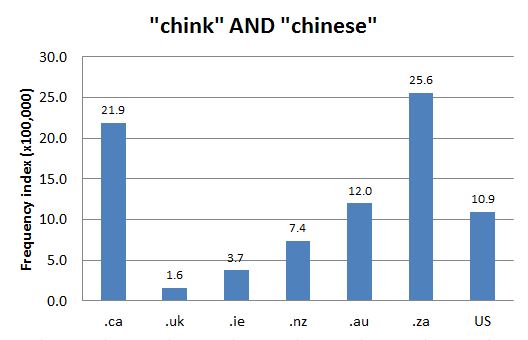DCHP-2
chink derogatory, extremely offensive, Chink, chinky DCHP-2 (October 2016)
n. — derogatory, extremely offensive, Ethnicities
an ethnic slur referring to people of East Asian, typically Chinese, descent.
Type: 6. Memorial — Chink is an ethnic slur used to refer to a person of Chinese or East Asian descent. The term gained traction in the late 1800s, coinciding with an increase in Chinese migrant workers to the Pacific Coast of North America (Hughes 2006: 75). Allen (1983: 53) lists 1880 as the date of the first American attestation of chink (cf. DARE, s.v. "chink" (3); earliest quotation 1901) and Canadian examples follow soon after (see the 1893 quotation). The uses, shown in the quotations, reveal the widespread discriminatory and racist stances of many Canadians.
The term was used in a number of compounds and contexts. A fish butchering machine invented in 1905 that replaced Chinese labour in fisheries was dubbed the iron chink (see the entry). According to Roy (2007: 319), in 1965 the periodical Chinatown News called for the elimination of chink and other derogatory terms in public discourse, following the lead of the Japanese Canadian Citizens Association in its call to end the common use of jap.
Though chink initially targeted Chinese people, it was semantically generalized to refer to any person of Asian descent, such as Japanese, Vietnamese and Korean (see the 2007 quotation). Internet domain searches indicate that the term is still in circulation in Canada, and is currently used at levels comparable to South Africa’s, a country plagued by apartheid for almost half of the 20th century (see Chart 1).See also: Chinaman Chinese laundry iron chink crawfish
- The term is included for reasons of historical accuracy and completeness. It is not intended, as clearly indicated in the usage labels "derogatory" and "extremely offensive", as a term for current use or a term, meaning or usage that is in any way condoned.
References:
Images:
Chart 1: Internet Domain Search, 28 Apr. 2015
